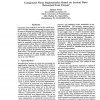Free Online Productivity Tools
i2Speak
i2Symbol
i2OCR
iTex2Img
iWeb2Print
iWeb2Shot
i2Type
iPdf2Split
iPdf2Merge
i2Bopomofo
i2Arabic
i2Style
i2Image
i2PDF
iLatex2Rtf
Sci2ools
105
click to vote
ANLP
2000
2000
Compound Noun Segmentation Based on Lexical Data Extracted from Corpus
Compound noun analysis is one of the crucial problems in Korean language processing because a series of nouns in Korean may appear without white space in real texts, which makes it difficult to identify the morphological constituents. This paper presents an effective method of Korean compound noun segmentation based on lexical data extracted from corpus. The segmentation is done by two steps: First, it is based on manually constructed built-in dictionary for segmentation whose data were extracted from 30 million word corpus. Second, a segmentation algorithm using statistical data is proposed, where simple nouns and their frequencies are also extracted from corpus. The analysis is executed based on CYK tabular parsing and min-max operation. By experiments, its accuracy is about 97.29%, which turns out to be very effective.
Related Content
| Added | 01 Nov 2010 |
| Updated | 01 Nov 2010 |
| Type | Conference |
| Year | 2000 |
| Where | ANLP |
| Authors | Juntae Yoon |
Comments (0)

